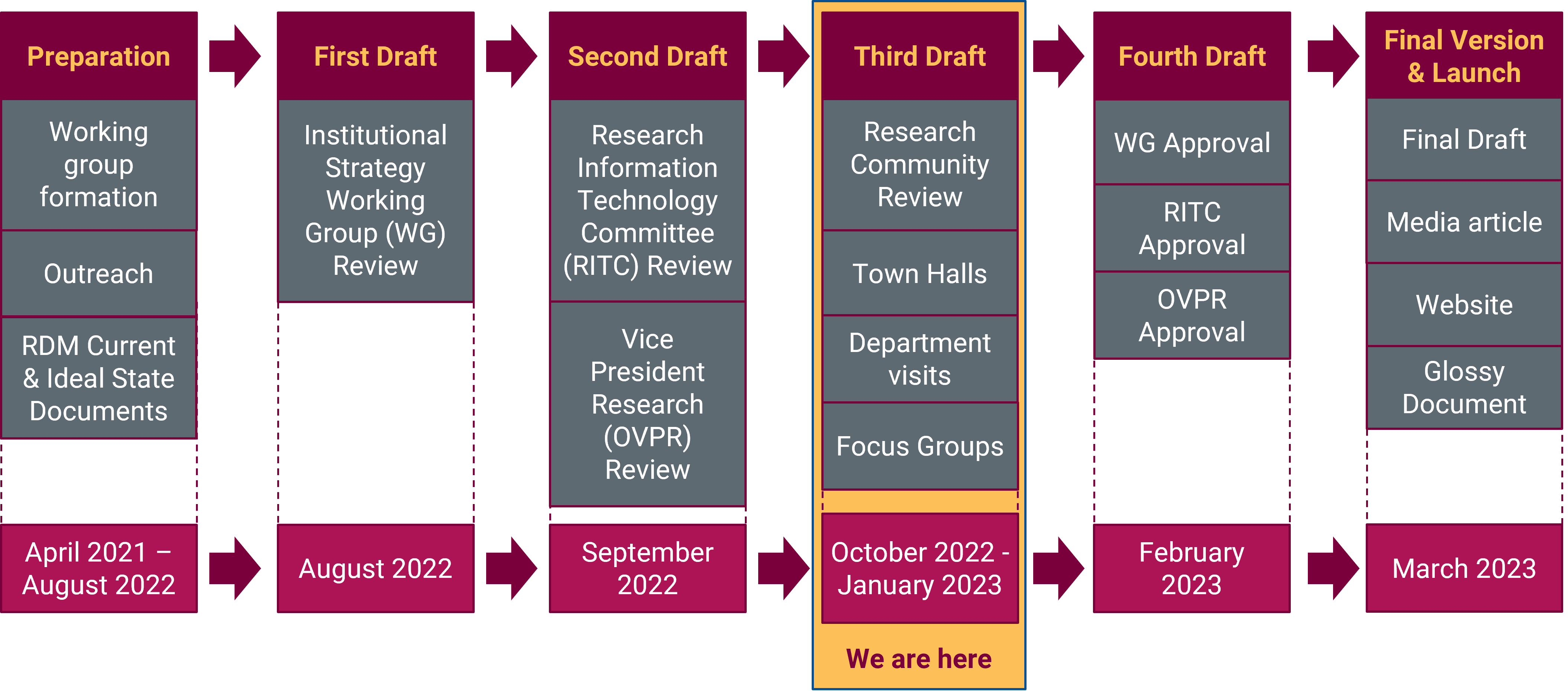Context
Research Data Management (RDM) refers to a set of practices and activities that include the planning, collection, documentation, storage, preservation, and sharing of research data. Good RDM practices help to increase research visibility and build new collaborations, enable verification of research results, and support a culture of reproducible research. In support of the application of RDM best practices, the Tri-Agencies released a Draft Research Data Management Policyi consisting of three central pillars of activities:
- The development of institutional research data management strategies;
- The implementation of research data management plans into the grant application process; and,
- The deposit into a digital repository all sharable research data, metadata, and code that directly support published results.
Mandate
This group is tasked with the first pillar of the Draft Policy: developing a draft institutional RDM strategy, to be reviewed by IT Governance. The group will use the Portage Network’s institutional strategy template and guidance documentsii as a foundation for its work, proceeding through the four fundamental steps to building an institutional RDM strategy:
- Raise awareness
- The working group will identify local RDM stakeholders and champions and engage with stakeholders to raise awareness of RDM on campus.
- Assess institutional readiness
- The working group will undertake a review of the current RDM landscape on campus and assess existing capacity and resources for managing the research data produced by McMaster researchers. This will involve:
- Defining ideal RDM supports and services
- Identifying current research data management practices on campus
- Evaluating existing RDM services and identifying service gaps
- Formalize RDM practices
- The working group will develop a set of procedures for RDM service providers and a set of coherent guidelines on RDM best practices for the campus.
- Define a roadmap
- Based on the information gathered in the previous steps, the working group will develop a roadmap for how we can move from the existing RDM services to the defined ‘Ideal’ state of RDM support and services.
This Committee is a subcommittee of the Research Information Technology Committee (RTC) and will bring draft documents to RTC for consideration.
Term
The group will work until the Draft Strategy has been submitted and approved, estimated to be in early-to mid-2022.
Membership
The working group will comprise one representative from Research Administration Offices (ROADS, HRS, MILO), Research Ethics Boards (MREB, HiREB, AREB), RHPCS, UTS, RDM Services, Hospital Research Offices, PHRI, MIRI, McMaster Libraries (MUL, HSL) and representatives from the Faculties of Humanities, Social Science, Engineering, Science, and Health Science.
Decision making
- Quorum of the committee is defined as 50% of all voting members.
- The committee aims to make decisions by consensus. Where consensus cannot be reached, decisions shall be made by a majority vote (50% plus 1) of those present.
- Quorum is required for any formal vote.
Meeting Frequency
Every month or more frequently if required. Meetings shall normally be 1 hour.
Sponsors
Vivian Lewis – University Librarian, McMaster University Library
Ranil Sonnadara – Special Advisor to the Vice President Research
References
i Canada, Innovation, Science and Economic Development Canada, Office of the Deputy Minister, Communications and Marketing Branch. “DRAFT Tri-Agency research data management policy for consultation,” 2018,
ii Portage Network. “Institutional RDM Strategy Working Group: Draft Documents”. n.d.

